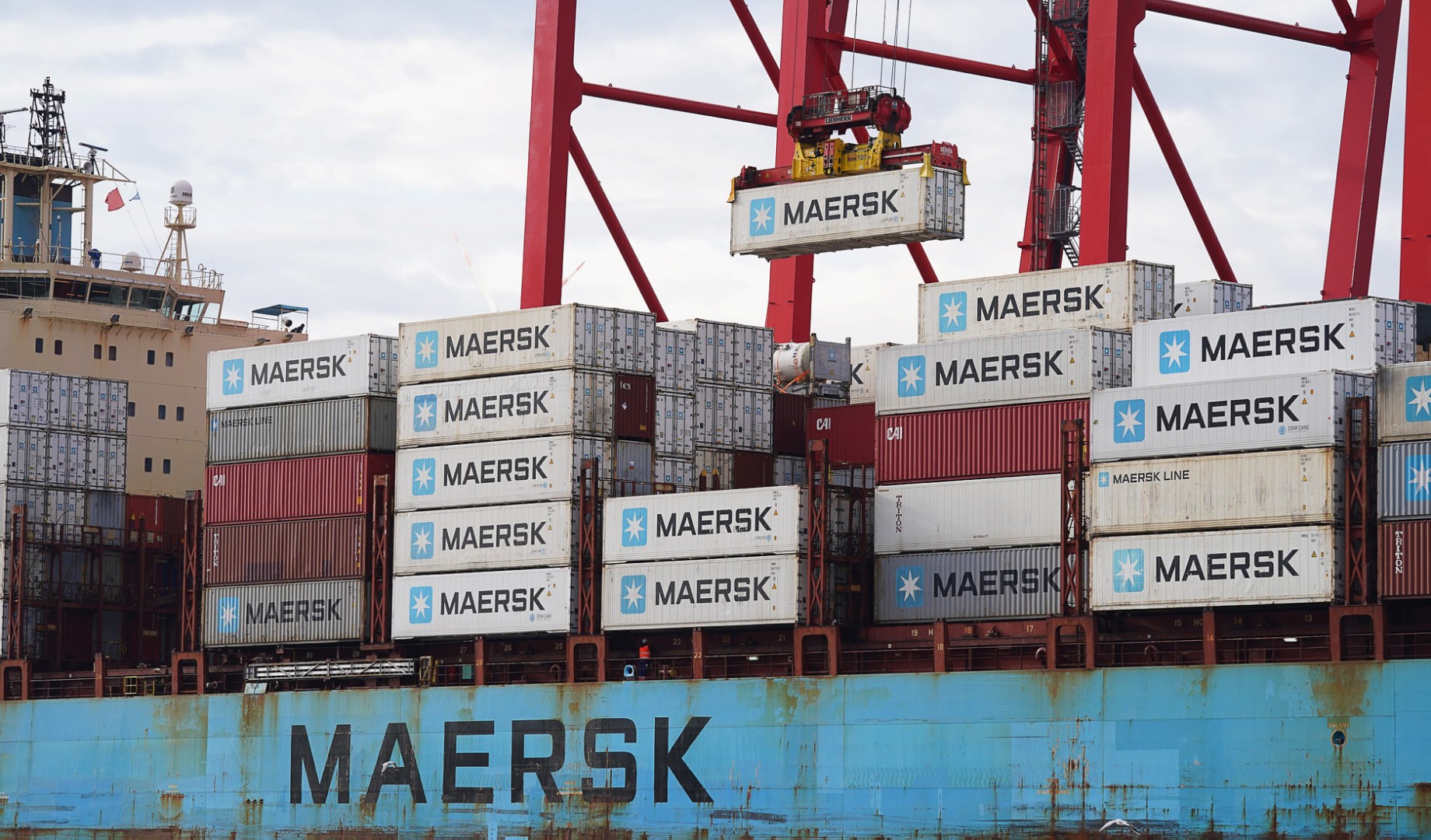
Posts falsely claim Nigeria's announcement of trade deal sank shipping giant Maersk's stock
- This article is more than one year old.
- Published on May 8, 2024 at 16:25
- 5 min read
- By Tonye BAKARE, Samad UTHMAN, AFP Nigeria
“Maersk lost almost 4% of their market capitalization in less than 12 hours after Tinubu's administration falsely announced that the company was going to invest $600 million in Nigeria,” reads an X post published on April 30, 2024, by Godswill Nwankwo, a self-proclaimed politician and supporter of opposition leader Peter Obi.
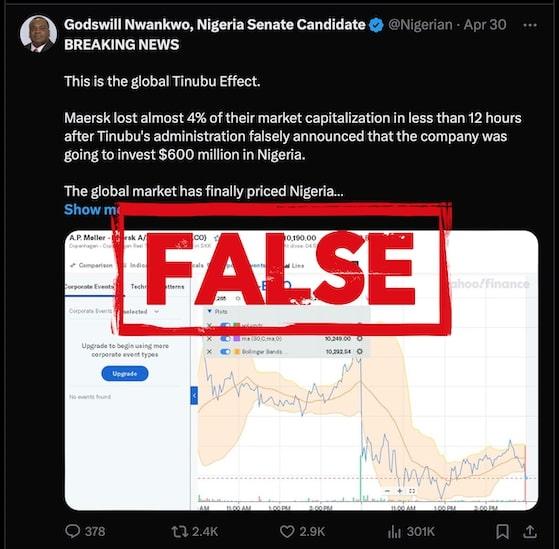
His comments came a day after Nigeria announced that Maersk would invest $600 million in its operations in Africa’s largest democracy (archived here).
The post features a screenshot of the closing price of Maersk stock value on April 29, 2024. A “Yahoo Finance” watermark can be seen on the screenshot.
Nwankwo wrote that the “false announcement” forced the “global market” to “finally price Nigeria as a junk asset class”.
His timeline on X shows frequent criticism of Nigerian President Bola Tinubu while praising the Labour Party’s Obi.
Media controversy
The investment deal in question was sealed after Maersk chairman Robert Maersk Uggla and Tinubu met on the sidelines at a World Economic Forum gathering in Riyadh, Nigerian presidential spokesman Ajuri Ngelale told AFP on April 28.
A day after the announcement, UK-based shipping publication Lloyd’s List published a story saying that the $600-million investment “appears to be news to Maersk” (archived here).
According to the article, the agreement “appears to be less solid than the government initially claimed”.
Although Maersk had confirmed that Uggla “discussed the investment” with Tinubu in Saudi Arabia, it was not “able to comment on any investment talks”.
Nigerian journalist Rotus Oddiri said Maersk shared the same statement with him (archived here).
I reached out to the @Maersk media team on the $600m Investment in Nigeria and here is what they said:
— Rotus (@Rotankwot) April 30, 2024
"A.P. Moller-Maersk (Maersk) has been present in Nigeria for 35 years and, as a global provider of logistics services, we remain committed to develop opportunities for growth… pic.twitter.com/PdlaGFigLx
Although Maersk did not categorically deny news about the financial deal, several Nigerian news outlets reported (see here, here, here and here) that the government had jumped the gun.
The controversy gained more traction after Tinubu’s media adviser Bayo Onanuga deleted his X post shortly after the announcement of the agreement.
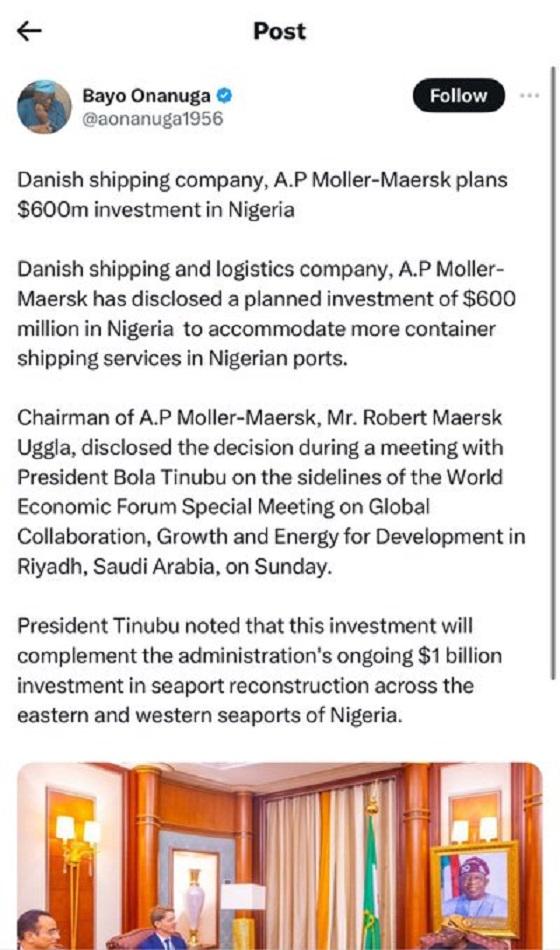
Another Tinubu adviser, Dada Olusegun, blamed the media for creating the controversy, noting that “Maersk hasn't contradicted or denied the Federal Government of Nigeria's statements” (archived here).
The media's headline choice sparked controversy, not Maersk's. Maersk hasn't contradicted or denied the Federal Government of Nigeria's statements. https://t.co/Z4sW3nTfwY
— Daddy D.O (@DOlusegun) April 30, 2024
The $600 million plan
On February 9, 2024, Nigeria’s trade minister published a video of Maerks's APM Terminals CEO Keith Svendsen talking about his company’s plan to invest “half a billion dollars” in Nigeria. This followed the recent conclusion of a $100-million project (archived here) at the West Africa Container Terminal in the southern Rivers state.
Teamed up with the Director General of the Oil and Gas Free Trade Zone to welcome key investors in the OG sector, expanding their investments in Nigeria#investment#InvestinNigeria#TradeInvestNG#WithHeartandMightpic.twitter.com/RiIJuiEpVV
— Hon (Dr) Doris Nkiruka Uzoka-Anite MD,CFA (@DrDorisAnite) February 9, 2024
Nigeria’s Ministry of Marine and Blue Economy also issued a press statement about Svendsen pledging a $500-million investment (archived here).
Yesterday, the Honorable Minister @GboyegaOyetola received the Global CEO of APM Terminals, Mr. Keith Svendsen, who expressed readiness to invest half a billion dollars in Apapa Port in Lagos. pic.twitter.com/smT0bBFalw
— Federal Ministry of Marine and Blue Economy (@FMoMBENigeria) February 9, 2024
On May 3, 2024, the CEO confirmed plans to invest $500 million in Nigeria on his LinkedIn account (archived here). He also shared a link to an article discussing the proposal (archived here).
“I earlier this year publicly told about the proposal to invest more than $500 million that we have discussed with the President Tinubu both in February and which we further elaborated in late April,” the report quoted Svendsen as saying.
Stock performance
The Maersk stock closed at 9,940 Danish Krone ($1,430) on April 26 – two days before the Nigerian government announced the investment deal.
On April 29, it opened at 10,122 DK, spiking to a day's high of 10,329.71 DK before closing at 10,195 DK.
The stock dipped further as Maersk prepared to release its end-of-month Q1 report.
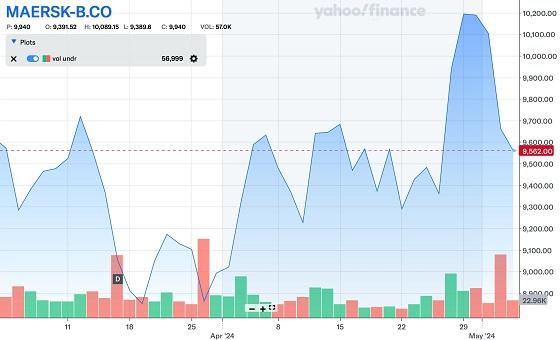
As AFP reported, the net profit for the first quarter of 2024 sank by 13 percent on the back of rising costly attacks on the Red Sea route (archived here)
Moreover, Yahoo! Finance data show that Maersk shares were at their highest on April 29 since the beginning of March.
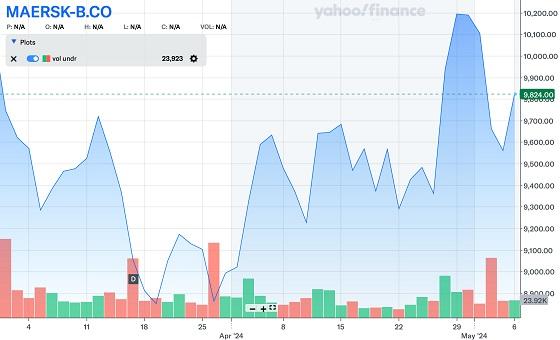
Sovereign rating
Nwankwo said of the country's sovereign debt rating: “The global market has finally priced Nigeria as a junk asset class.”
However, Nigeria has long been considered a speculative investment by the main rating agencies, meaning it holds particular risk for investors (archived here). Bonds issued by countries in the same category as Nigeria, or worse, are said to be “junk”.
However, Fitch Ratings revised the country’s outlook from “stable” to “positive” on May 3, 2024 (archived here), a reflection of Tinubu’s reforms since taking office a year ago, the agency said.
Tinubu ended a costly fuel subsidy immediately after his inauguration (archived here) and liberalised foreign exchange controls soon after.
“The positive outlook partly reflects reforms over the last year to support the restoration of macroeconomic stability and enhance policy coherence and credibility,” Fitch added.
Copyright © AFP 2017-2026. Any commercial use of this content requires a subscription. Click here to find out more.
Is there content that you would like AFP to fact-check? Get in touch.
Contact us
